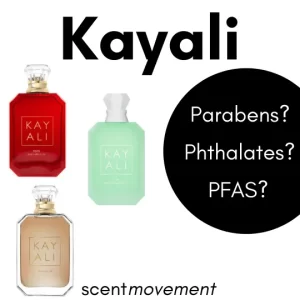
Dupe for Tom Ford Lost Cherry = Fine’ry Not Another Cherry
Looking for a dupe of Lost Cherry by Tom Ford? We’ve got you covered!

Perfume is an essential part of many people’s daily routine, and for some, it can become a signature scent that defines their personality. However, with so many different fragrances on the market, it can be challenging to find the right one. One term that often comes up when discussing perfume is “cloying.” This article will explore what cloying means in terms of perfume and how to avoid it.
When it comes to perfume, the term “cloying” is often used to describe a scent that is overpowering. Often cloying is used to describe a perfume that is excessively sweet, or “sickly sweet”. What one person finds “cloying”, another person might enjoy (and not find cloying).
Cloying perfumes are the kind of scents that can make people feel overwhelmed or nauseous when they are worn in excess.
This can happen when the fragrance has a high concentration of certain scent profiles – often sweet ones. This can be overpowering in large amounts and can quickly become cloying.
When a fragrance is cloying, it can also be described as being “too much.” This can happen when the fragrance is applied too heavily, or when the wearer is in a small, enclosed space, like an elevator or a car. In these situations, the scent can quickly become overpowering and make those around the wearer feel uncomfortable.
When a perfume is described as cloying, it means that it is so overpowering that it can cause headaches, nausea, and even repulsion to either the wearer, or those around the wearer.
Cloying perfumes can cause headaches and nausea, which can be particularly troublesome if the wearer is prone to these issues. In addition, a cloying perfume can be very off-putting to others, leading to social isolation and a negative impression. If the wearer enjoys a certain perfume, but those around them find it cloying, it can lead to issues. Cloying perfumes can be difficult to wear in public spaces, especially enclosed areas such as offices, restaurants, and public transport. These spaces have a lot of people in close proximity, and a strong perfume can be overwhelming for others. It can even be a health hazard for those with allergies or asthma.
Another reason a perfume can be cloying is the use of synthetic ingredients. Synthetic fragrances can be cheaper to produce and are often used to mimic natural scents. However, they can also be very strong and overpowering, leading to a cloying effect. It is important to note that not all synthetic fragrances are cloying, but it is a risk that is often associated with them.
Cloying is a negative term used to describe a perfume that is too sweet, heavy, or overwhelming in nature.
A perfume that is cloying can be overwhelming, and may cause headaches or nausea for some people. This can be due to a variety of factors, including the concentration of certain notes, the use of heavy or dense ingredients, or simply an unbalanced composition. However, what may be cloying to one person may not be to another, as scent preferences are subjective.
To avoid cloying fragrances, it is essential to understand the ingredients that are typically associated with this type of scent. As mentioned earlier, sweet scents can quickly become cloying. Other scents that can have a similar effect include patchouli, amber, and some floral scents like rose and jasmine. A perfume with too many sweet or floral notes can be overwhelming and overpowering. This is because the scent can become too concentrated and dense, leading to a cloying effect. It is important to balance the notes in a perfume to create a more complex and nuanced scent that is pleasant to wear. These ingredients are often used in large concentrations in fragrances, and it is essential to be aware of how much of these ingredients are in a perfume before purchasing it.
There are several factors that can contribute to a perfume being cloying. One of the most common reasons is the concentration of fragrance oils used in the perfume. The higher the concentration of oils, the stronger and more overpowering the perfume can be. This is why many high-end perfumes are designed to be worn in small amounts, as they have a higher concentration of oils.
To avoid cloying perfumes, it is essential to test fragrances before purchasing them. This can be done by sampling perfumes at a store or purchasing a small amount to test at home. It is important to test the perfume on your skin to see how it reacts with your natural scent. When testing a fragrance, apply it lightly to your skin and wait for a few minutes before smelling it. This will give the fragrance time to settle and develop, and you will be able to get a better sense of how it will smell over time. This will also allow you to determine whether or not the perfume is too strong or overpowering.
Another way to avoid cloying fragrances is to choose lighter scents that are less intense. Lighter fragrances are often more refreshing and easier to wear than heavier scents. They are perfect for everyday wear and are less likely to become overwhelming over time. Examples of lighter fragrances include citrus scents like lemon and bergamot, as well as herbal scents like lavender and mint.
How much you spray can also push an otherwise pleasant perfume into being “cloying”. Simply adjusting the application method can also help to avoid a cloying effect. For example, using a light misting or applying the fragrance to specific pulse points rather than dousing oneself in the scent can help to prevent the scent from becoming too overpowering.
It is important to note that some fragrances may be intentionally designed to be cloying, as they are meant to be a bold and impactful statement. However, for those seeking a more subtle and nuanced fragrance, it may be best to avoid perfumes that are described as “heavy,” “syrupy,” or “sickly sweet.”
In conclusion, the term “cloying” in perfume refers to a scent that is excessively sweet or overpowering. While some may enjoy this type of fragrance, others may find it too intense or nauseating. Testing a fragrance on your skin and adjusting the application method can help to prevent a cloying effect. Ultimately, it is a matter of personal preference and finding the right fragrance for your individual taste.
To avoid cloying fragrances, it is essential to be aware of the ingredients that are often associated with this type of scent, and to choose lighter fragrances that are less intense. When shopping for perfume, it is important to test the fragrance before purchasing it, to get a better sense of how it will smell throughout the day. By following these tips, you can avoid cloying fragrances and find the perfect scent that suits your personality and lifestyle.

Looking for a dupe of Lost Cherry by Tom Ford? We’ve got you covered!

Looking for the perfect perfume for spring? We’ve got lots of great options!

Do Kayali perfumes contain parabens? phthalates? PFAS? We take an in-depth look.

Do Byredo perfumes contain parabens? phthalates? PFAS? We take an in-depth look.

We’ve put together a comprehensive list of the *best* cheap citrus perfumes on the market.